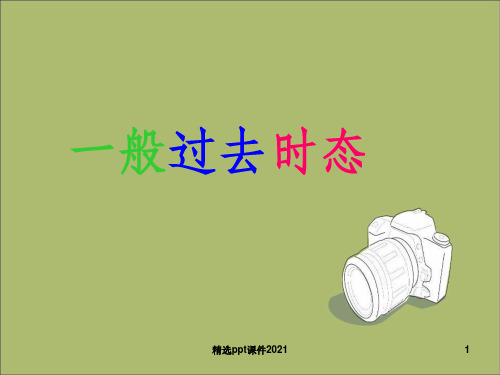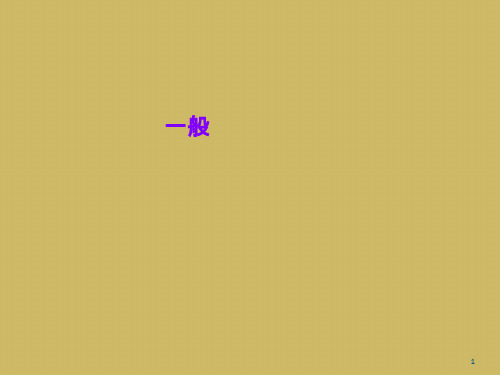英语微课一般过去式(ppt课件)
合集下载
一般过去时课件(PPT)

整理ppt
19
4. _A_your father at work yesterday﹖ A. Was B. Is C.Were D.Are
5. —Who was on duty last Friday﹖
—___B___.
A. I am
B. I was
C. Yes, I was D. No, I wasn't
1, I am a student I __w_a_s__ a student 10 years ago .
2, She is a student She _w_a_s___ a student 10 years ago .
3, You are a student You _w__e_re__ a student 10 years ago .
我今年12岁. I _a_m_ 12 years old this year.
我去年11岁. I _w_a_s_ 11 years old last year.
整理ppt
13
他现在在北京。 He __is__ in Beijing now.
他昨天在上海。 He _w_a_s_ in Shanghai yesterday.
2、Joe and Brian were my brothers. (否定句)Joe and Brain were not my brothers.
= Joe and Brain weren’t my brothers.
was not = wasn’t
were not = 整w理epptren’t
23
stop — stopped
nod — nodded
整理ppt
10
4.以辅音字母加y 结尾的词,把 y 变成 i,再加ed
一般过去时讲解PPT课件

Yes,you did.
Yes,I did. Yes,he/she/it did.
No,you did not. No, I did not. No,he/she/it did not.
work Did we work?
Did you work? Did they work?
Yes,we/you did. Yes,we did. Yes,they did.
grow -- grew know -- knew throw -- threw blow -- blew write -- wrote drive -- drove ride -- rode get -- got forget -- forgot lend -- lent send -- sent spend -- spent say -- said */sed/ pay -- paid stand -- stood understand -- understood let -- let put -- put cut -- cut read -- read2*0
.
1
1.定义:
(用法一) 一般过去时态表示过去某个时间发生的动 作或存在的状态,常和表示过去的时间状语连用;
eg:I got up at 7:00 yesterday.
My father was at work yesterday afternoon
(用法二) 也表示过去经常或反复发生的动作,常和 表示频度的时间状语连用。
写出下列动词的过去式:
go
went
use
think thought live
be
was/ were wake
happen happened keep
一般过去时ppt课件

2、表示过去经常或反复发生的动作。 My father often went to work by bus last year. When I was a child, I often listened to music.
常用时间 常与一般过去时态连用的时间有:
yesterday yesterday morning (afternoon, evening…) last night (week, month, year…) two days ago, a week ago, three years ago… in 1990, (in 1998…)
/t/ /d/ 之后念/id/
说明:
1、清念 /t/ ,即 ed 在清辅音后面念 /t/ ,例:finished helped
passed cooked
2、元浊 /d/ ,即 ed 在元音,浊辅音后面念 /d/ ,
例:borrowed enjoyed
called moved
3、/t/ /d/ 之后念 /id/ , 即 ed 在 /t/ /d/ 音后面念 /id/
looked played started lived hoped used
stopped planned tripped
4、结尾是“辅音字母+y”的动词, study studied
先变“y”为“i”再加—ed
carry carried
精选ppt课件2021
4
规则动词词-ed的读音
清念 构成 读音
精选ppt课件2021
3
规则动词过去式的构成
构成规则
例词
1、一般在动词原形末尾加– ed
2、结尾是 e 的动词加 -- d
3、末尾只有一个辅音字母的 重读闭音节词,先双写这 个辅音字母,再加—ed
常用时间 常与一般过去时态连用的时间有:
yesterday yesterday morning (afternoon, evening…) last night (week, month, year…) two days ago, a week ago, three years ago… in 1990, (in 1998…)
/t/ /d/ 之后念/id/
说明:
1、清念 /t/ ,即 ed 在清辅音后面念 /t/ ,例:finished helped
passed cooked
2、元浊 /d/ ,即 ed 在元音,浊辅音后面念 /d/ ,
例:borrowed enjoyed
called moved
3、/t/ /d/ 之后念 /id/ , 即 ed 在 /t/ /d/ 音后面念 /id/
looked played started lived hoped used
stopped planned tripped
4、结尾是“辅音字母+y”的动词, study studied
先变“y”为“i”再加—ed
carry carried
精选ppt课件2021
4
规则动词词-ed的读音
清念 构成 读音
精选ppt课件2021
3
规则动词过去式的构成
构成规则
例词
1、一般在动词原形末尾加– ed
2、结尾是 e 的动词加 -- d
3、末尾只有一个辅音字母的 重读闭音节词,先双写这 个辅音字母,再加—ed
一般过去时.语法讲解ppt课件

精选ppt课件2021
一般过去时态
精选ppt课件2021
1
1. 含 义
一般过去时表示过去某个时间发生的 动作或存在的状态。常和表示过去的时 间连用。如last year,yesterday等. 我每天去上学。 我昨天去上学。 I went to school yesterday. 他每天下午都去打篮球。
他上星期一打篮球。
2.表示过去经常或反复发生的动作。
My father often went to work by bus last year.
When I was a child, I often listened to music.
精选ppt课件2021
3
3.表示已故人所做的事情。
Comrade Lei Feng did good deeds in his life.
精选ppt课件2021
2
2. 用 法
1.表示过去某个时间发生的动作或存在的状态。 He was here yesterday. I got up at six thirty yesterday morning. My father was at work yesterday afternoon. Did you have a good time last summer?
6.行为动词一般过去时的疑问式
一般过去时的一般疑问式在句首加助动词did Did+主语+动词原形……?
They f_in_i_sh_e_d_(finish) their work at four. 一般疑问句:
_D_i_d_ they _f_in_i_sh_ their work at four? Yes, they _d_id___. No, they _d_id_n_’_t.
一般过去时ppt课件

T
2.简略回答用助动词did/didn’t代替
行为动词。
Did he find the boy yesterday?
-Yes, he did.
-No, he did not (didn’t).
28
写出下列动词的过去式
1. look looked 11. go
went
2. live lived
12. have has
morning
yesterday afternoon
evening
the day before yesterday 25
4.与one 连用: morning
one
evening day
Monday afternoon
5.与that 连用:
that
morning winter day year
26
6.其他时间状语:
4.What time diydou ( geett) to school this
morning?
5.Jim di(ddo) a lot yesterday. He (go)
swhoepnpt ing and
(cook) csouopkpedr.
31
1.Lucy did her homework at home.
Does he go to school by bus every day?
Did he gtoo school by bus yesterday?
don’t/ doesn’t
didn’t
do/ does
did 10
谓语构成
1.动词 be
was , were
2.动词 have, has
一般过去时课件(PPT)98984

一般过去时课件 (PPT)98984
Read and say
wash the clothes visit grandparents clean the room watch TV climb a mountain Study Chinese
stay at home answer the phone water the flower play football read a book have a cold
▪
3. They _w_e__r_e__ glad to see each other
last month.
▪
4. Helen and Nancy __a__r_e___ good
▪
friends. 5. The
little
dog
_i_s___ two years old
this year.
▪
6. Look, there _a_r__e____ lots of grapes
She doesn’t play basketball after school.
She _d_id_n_’t__pl_a_y_ basketball after school yesterday.
Do you go to school on foot every day? _D_id_ you _g_o to school on foot yesterday.
3.She stayed there for a week. (对划线部分提问)
H_o_w__lo_ng__d_id____ she s_t_a_y__ there? 4.There was some orange in the cup.
_p_l_a_y__e_d_ (play)
Read and say
wash the clothes visit grandparents clean the room watch TV climb a mountain Study Chinese
stay at home answer the phone water the flower play football read a book have a cold
▪
3. They _w_e__r_e__ glad to see each other
last month.
▪
4. Helen and Nancy __a__r_e___ good
▪
friends. 5. The
little
dog
_i_s___ two years old
this year.
▪
6. Look, there _a_r__e____ lots of grapes
She doesn’t play basketball after school.
She _d_id_n_’t__pl_a_y_ basketball after school yesterday.
Do you go to school on foot every day? _D_id_ you _g_o to school on foot yesterday.
3.She stayed there for a week. (对划线部分提问)
H_o_w__lo_ng__d_id____ she s_t_a_y__ there? 4.There was some orange in the cup.
_p_l_a_y__e_d_ (play)
一般现在时、一般过去时和一般将来时课件(PPT31张)

I/You/He/She/It/ We/ You/They worked.
Was I…. ? Was he/she/it…? Were we/you/they…? Was/Were there …? Did I/you/he/she/it/ we/ you/they work
I was not(wasn’t)…. He/She/It was not (wasn’t)…. We/You/They were not (weren’t)… There was/were not….
( C ) Alice is a nice girl. She ____ to
help others.
A. ready
B. always glad
C.is always D.is always ready
__D_o__ Sam and his friends often _p_la_y__(play) games during the morning break?
A. will meet B meet C. am waiting D wait
9. Where A___ after class today?
A. will you go B. are you go C. you are going D. you will go
10. –It’s 7 p.m. They did not eat anything .
husband or son?
-- _A___
A. Yes , she will B. Yes, she visits C. Yes, with her son D. With her son
5. There _C___ a wonderful football match tomorrow.
Was I…. ? Was he/she/it…? Were we/you/they…? Was/Were there …? Did I/you/he/she/it/ we/ you/they work
I was not(wasn’t)…. He/She/It was not (wasn’t)…. We/You/They were not (weren’t)… There was/were not….
( C ) Alice is a nice girl. She ____ to
help others.
A. ready
B. always glad
C.is always D.is always ready
__D_o__ Sam and his friends often _p_la_y__(play) games during the morning break?
A. will meet B meet C. am waiting D wait
9. Where A___ after class today?
A. will you go B. are you go C. you are going D. you will go
10. –It’s 7 p.m. They did not eat anything .
husband or son?
-- _A___
A. Yes , she will B. Yes, she visits C. Yes, with her son D. With her son
5. There _C___ a wonderful football match tomorrow.
一般过去时讲解PPT课件

。
did
助动词,用于构成一般过去时的 疑问句和否定句。
主语
句子中的动作执行者,可以是名 词、代词等。
例如
What did you do yesterday? 你 昨天做了什么?
其他成分
包括宾语、状语等,根据句子需 要而定。
动词原形
指动词的基本形式,即不加任何 时态或语态标记的形式。
特殊疑问句实例分析
when、after、 before、as等引导的 表示过去的时间状语 从句。
已经、曾经、刚才、 那时等表示过去的时 间副词。
02
一般过去时肯定句结构
主语+动词过去式+其他成分
01
02
03
主语
句子中的主体,可以是人 、物或抽象概念。
动词过去式
表示过去某个时间里发生 的动作或状态。动词的过 去式可分为规则变化和不 规则变化两种。
表示过去某个时间里发生的动 作或状态。
用法
陈述过去的事实或情况,描述 过去经常或反复发生的动作。
现在完成时
表示过去发生的动作对现在造 成的影响或结果,或从过去已 经开始,持续到现在的动作或 状态。
用法
强调过去与现在的联系,表达 一个动作从过去一直延续到现
在。
两者在时间状语上的区别
01
02
03
04
一般过去时
一般过去时讲解PPT课件
目录 Contents
• 一般过去时基本概念 • 一般过去时肯定句结构 • 一般过去时否定句结构 • 一般过去时疑问句结构 • 一般过去时特殊疑问句结构 • 一般过去时与现在完成时的比较
01
一般过去时基本概念
定义与作用
定义
一般过去时表示过去某个时间里 发生的动作或状态。
did
助动词,用于构成一般过去时的 疑问句和否定句。
主语
句子中的动作执行者,可以是名 词、代词等。
例如
What did you do yesterday? 你 昨天做了什么?
其他成分
包括宾语、状语等,根据句子需 要而定。
动词原形
指动词的基本形式,即不加任何 时态或语态标记的形式。
特殊疑问句实例分析
when、after、 before、as等引导的 表示过去的时间状语 从句。
已经、曾经、刚才、 那时等表示过去的时 间副词。
02
一般过去时肯定句结构
主语+动词过去式+其他成分
01
02
03
主语
句子中的主体,可以是人 、物或抽象概念。
动词过去式
表示过去某个时间里发生 的动作或状态。动词的过 去式可分为规则变化和不 规则变化两种。
表示过去某个时间里发生的动 作或状态。
用法
陈述过去的事实或情况,描述 过去经常或反复发生的动作。
现在完成时
表示过去发生的动作对现在造 成的影响或结果,或从过去已 经开始,持续到现在的动作或 状态。
用法
强调过去与现在的联系,表达 一个动作从过去一直延续到现
在。
两者在时间状语上的区别
01
02
03
04
一般过去时
一般过去时讲解PPT课件
目录 Contents
• 一般过去时基本概念 • 一般过去时肯定句结构 • 一般过去时否定句结构 • 一般过去时疑问句结构 • 一般过去时特殊疑问句结构 • 一般过去时与现在完成时的比较
01
一般过去时基本概念
定义与作用
定义
一般过去时表示过去某个时间里 发生的动作或状态。
一般过去时(公开课)ppt课件ppt

汇报人:
感谢观看
常与used to do sth连用
结构:would+动词原形
表示过去的习惯或经常性动作,现在已不再延续
常用于口语中,表示过去的习惯或经常性动作
表示过去的状态或情感
添加标题
添加标题
添加标题
添加标题
表示过去某时刻的感受或情感
描述过去持续的状态
描述过去经常发生的事情
表示过去某个时间段内发生的事情
表示过去的经验或经历
用于if引导的虚拟条件句中
用于as if / as though引导的方式状语从句中
用于It is / was + a long time + since引导的状语从句中
用于某些表示过去连续动作的词组中,如:in those days,at that time等。
04
一般过去时的句型转换
肯定句转换为否定句
难点解析
概念理解:区分一般现在时和一般过去时
动词时态变化:规则与不规则变化
时间状语辨析:when、before、after等词语的用法
句型转换:肯定句与否定句、疑问句与陈述句的转换
易错点提醒
助动词did后面的动词用原形
过去时态中动词用过去式
助动词had、will、have后面的动词用原形
情态动词后面的动词用原形
,a click to unlimited possibilities
一般过去时(公开课)ppt课件ppt
目录
01
一般过去时的定义和用法
02
一般过去时的常见形式
03
一般过去时的特殊用法
04
一般过去时的句型转换
05
一般过去时的练习与巩固
PPT讲解(一般过去时).ppt

(was + not = wasn't , were + not = weren't) 在右侧编辑区输入内容
He wasn't an English teacher ten years ago. 在右侧编辑区输入内容
(3)一般过去时的一般疑问句: a.Did + 主语 + 动词原形 + 宾语 ? Did you study English in 1990 ? b.Was/Were + 主语 + 表语 ? Was he a pupil five years ago ?
3
3._______ you ______ (go) to the Great Wall last year?
5
5.The old man _______(be)ill and went to see a doctor.
2Hale Waihona Puke 2.Jack ____________ (study) for the English test last Sunday.
I was at home yesterday. 昨天我在家。
02
2、在表示过去某个时间里发生的动作,用动词的过去式构成。如:
I visited my uncle yesterday. 昨天我拜访了我的叔叔。
各种句式
01
(1)一般过去时的肯定 陈述句:主语 + 动词过
去式 + 宾语或表语。
He worked in Shanghai ten years ago.
PPT讲解(一般过去 时).ppt
演讲人
目录
PPT讲解(一般过去时).ppt
PPT讲解(一般过去时).ppt
一、定义:表示在的过去某个时间里所发生的动作或存在的状态。
一般过去时课件(PPT)

bring→brought,fight→fought 6.“教书”“抓住”——aught切莫忘 如:
teach→taught,catch→caught 7.ow/aw改为ew是新时尚 如:
know→knew,grow→grew,
throw→threw,draw→drew 8.“放”“让”“读”过去式与原形一样 如:
1. 加助动词did或者didn’t后,动词 须返回原形。Choose F or T.
Did he went to school yesterday? F Did he go to school yesterday? T
2.They didn’t finish their homework last night.
I get up at 6:30 every morning. I _g_ot_ up at 9:00 last Sunday.
He plays football every afternoon. He _pl_a_y_ed_ basketball yesterday afternoon.
He does his homework every evening.
我今年12岁. I _a_m_ 12 years old this year.
我去年11岁. I _w_a_s_ 11 years old last year.
他现在在北京。 He __is__ in Beijing now. 他昨天在上海。 He _w_a_s_ in Shanghai yesterday.
他们今天在中国。 They _a_r_e_ in China today.
他们昨天在日本。 They _w_e_re_ in Japan yesterday.
teach→taught,catch→caught 7.ow/aw改为ew是新时尚 如:
know→knew,grow→grew,
throw→threw,draw→drew 8.“放”“让”“读”过去式与原形一样 如:
1. 加助动词did或者didn’t后,动词 须返回原形。Choose F or T.
Did he went to school yesterday? F Did he go to school yesterday? T
2.They didn’t finish their homework last night.
I get up at 6:30 every morning. I _g_ot_ up at 9:00 last Sunday.
He plays football every afternoon. He _pl_a_y_ed_ basketball yesterday afternoon.
He does his homework every evening.
我今年12岁. I _a_m_ 12 years old this year.
我去年11岁. I _w_a_s_ 11 years old last year.
他现在在北京。 He __is__ in Beijing now. 他昨天在上海。 He _w_a_s_ in Shanghai yesterday.
他们今天在中国。 They _a_r_e_ in China today.
他们昨天在日本。 They _w_e_re_ in Japan yesterday.
一般过去时课件(PPT)

他昨天在上海。 He _w_a_s_ in Shanghai yesterday.
他们今天在中国。 They _a_r_e_ in China today.
他们昨天在日本。 They _w_e_re_ in Japan yesterday.
am/ is are
was were
一、用be动词的适当形式填空
动词的一般过去时的否定式
一般过去时的否定式是在动词原形 前加助动词did not (didn’t).
主语+didn’t+动词原形
I _to_l_d_ (tell) them the news yesterday. I _d_id_n_’t__t_el_l _ them the news.
动词一般过去时的疑问式
3. 4.
IW_e_m____ha__ad____de___(m(haakvee))aampoadrteyl
last Halloween. ship with Mike
y5e. sTtheeryda_py_.l_a_y__e_d_ (play) chess in the
classroom last PE lesson.
I get up at 6:30 every morning. I _g_ot_ up at 9:00 last Sunday.
He plays football every afternoon. He _pl_a_y_ed_ basketball yesterday afternoon.
He does his homework every evening.
否定句: The children did not have a good time in the park. 一般疑问句:
他们今天在中国。 They _a_r_e_ in China today.
他们昨天在日本。 They _w_e_re_ in Japan yesterday.
am/ is are
was were
一、用be动词的适当形式填空
动词的一般过去时的否定式
一般过去时的否定式是在动词原形 前加助动词did not (didn’t).
主语+didn’t+动词原形
I _to_l_d_ (tell) them the news yesterday. I _d_id_n_’t__t_el_l _ them the news.
动词一般过去时的疑问式
3. 4.
IW_e_m____ha__ad____de___(m(haakvee))aampoadrteyl
last Halloween. ship with Mike
y5e. sTtheeryda_py_.l_a_y__e_d_ (play) chess in the
classroom last PE lesson.
I get up at 6:30 every morning. I _g_ot_ up at 9:00 last Sunday.
He plays football every afternoon. He _pl_a_y_ed_ basketball yesterday afternoon.
He does his homework every evening.
否定句: The children did not have a good time in the park. 一般疑问句:
相关主题
- 1、下载文档前请自行甄别文档内容的完整性,平台不提供额外的编辑、内容补充、找答案等附加服务。
- 2、"仅部分预览"的文档,不可在线预览部分如存在完整性等问题,可反馈申请退款(可完整预览的文档不适用该条件!)。
- 3、如文档侵犯您的权益,请联系客服反馈,我们会尽快为您处理(人工客服工作时间:9:00-18:30)。
学习交流课件
3
规则动词过去式的构成
构成规则
一般在动词原形末尾 加-ed
结尾是不发音e的动 词加-d
末尾只有一个辅音字 母的重读闭音节词,先 双写这个辅音字母,再 加-ed
结尾是“辅音字母+y” 的动词,先变“y”为 “ i”再加-ed
原形 work play hope live
stopHale Waihona Puke tripstudy worry
• 【例如】 • — Did you go to the park? • 你们去公园了吗?
学习交流课件
9
一般过去时的几种句型
• ⑷ 特殊疑问句:特殊疑问词+一般疑问句 • 【例如】 • — What did Amy do last weekend? • 艾米上周末干什么了? • — She visited her grandparents. • 他去看了他的祖父母。
一般过去
学习交流课件
1
自我介绍
一般过去式表示过去的某个时间发 生的动作或是存在的状态。
常和表示过去的时间状语(last year,yesterday,then等)连用。 如:I was a teacher(我曾经是老师)
学习交流课件
2
一般过去式的构成
• 一般过去式是依靠把动词变为过去 式来完成的。
学习交流课件
10
巧记动词过去时态
动词一般过去时,表示过去发生的事;
be用was或用were, have,has变had;
谓语动词过去式,过去时间坐标志;
一般动词加-ed,若是特殊得硬记。 否定句很简单,主语之后didn’t添;
疑问句也不难,did放在主语前;
如果谓语之前有did,谓语动词需还原;
动词若是was,were,否定就把not添。
学习交流课件
过去式 worked played hoped
lived
stopped tripped
studied worried
4
不规则动词的过去式需特殊记忆: 小学阶段常见的有:
am/is-was are-were go-went take-took see-saw make-made read-read write-wrote ride-rode have/has-had
学习交流课件
5
表示过去的时间的时间状语
yesterday 昨天 Last week 上周 Last night 昨天夜里 last year 那年 Three weeks ago 三周前 Then 那时
学习交流课件
6
一般过去时的几种句型
• ⑴ 肯定句“主语+动词过去式+其他”
• 【例如】 • Sam and Amy watched TV yesterday. • 萨姆和艾米昨天看电视了
学习交流课件
11
学习交流课件
7
一般过去时的几种句型
• ⑵ 否定句“主语+didn’t+动词原形+其他”
• 【例如】 • The girl didn’t play computer games
yesterday. • 这个女孩昨天没玩电子游戏。
学习交流课件
8
一般过去时的几种句型
• (3)一般疑问句“Did+主语+动词原形+其 他?”
